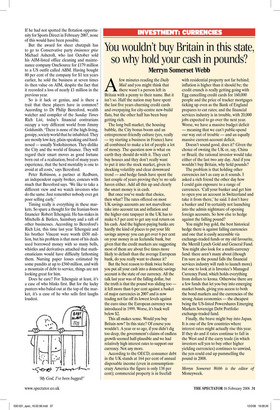You wouldn’t buy Britain in this state, so why hold your cash in pounds?
Merryn Somerset Webb
Afew minutes reading the Daily Mail and you might think that there wasn’t a person left in Britain with a penny to their name. But it isn’t so. Half the nation may have spent the last five years churning credit cards and overpaying for city-centre new-build flats, but the other half has been busy getting rich.
The long bull market, the housing bubble, the City bonus boom and an entrepreneur-friendly culture (yes, really — try starting a business in France) have all combined to make a lot of people a lot of money. The question now is what on earth they should do with it. They can’t buy houses and they don’t really want to put it into the stock market, given its shocking volatility and clear downward trend — and hedge funds have spent the last couple of years proving they’re no safe haven either. Add all this up and clearly the smart money is in cash.
But once you’ve made that choice, then what? The rates offered on most UK savings accounts are not marvellous: take into account tax and inflation and the higher-rate taxpayer in the UK has to make 6.5 per cent to get any real return on his cash. And the highest-paying banks are hardly the kind of places to put your life savings anyway: you can get over 6 per cent on your money in an Icelandic bank, but given that the credit markets are suggesting most of them are about five times more likely to default than the average European bank, do you really want to chance it?
But the best reason to think twice before you put all your cash into a domestic savings account is the state of our currency. All the talk last year was of the falling dollar, but the truth is that the pound was sliding too — it fell more than 6 per cent against a basket of major currencies in 2007 and is now trading not far off its lowest levels against the euro since the European currency was introduced in 1999. Worse, it’s back well below $2.
This all makes sense. Would you buy Britain now? In this state? Of course you wouldn’t. A year or so ago, if you didn’t dig too deep, the government’s claims of endless growth seemed half-plausible and we had relatively high interest rates to support our currency. Not any more.
According to the OECD, consumer debt in the UK stands at 164 per cent of annual disposable income (even in consumptioncrazy America the figure is only 138 per cent); commercial property is in freefall with residential property not far behind; inflation is higher than it should be; the credit crunch is really getting going with Egg cancelling credit cards for 160,000 people and the price of tracker mortgages ticking up even as the Bank of England prepares to cut rates; and the financial services industry is in trouble, with 20,000 jobs expected to go over the next year. Worse, we have a massive budget deficit — meaning that we can’t public-spend our way out of trouble — and an equally massive current-account deficit.
Doesn’t sound good, does it? Given the choice of owning the UK or, say, China or Brazil, the rational investor would take either of the last two any day. And if you wouldn’t buy Britain, why hold pounds?
The problem is that holding other currencies isn’t as easy as it sounds. I asked a rich friend the other day how I could gain exposure to a range of currencies. ‘Call your banker and get him to open you an account in Switzerland and take it from there,’ he said. I don’t have a banker and I’m certainly not launching into the admin nightmare of opening foreign accounts. So how else to hedge against the falling pound?
You might buy gold, the best historical hedge there is against falling currencies and one that is easily accessible via exchange-traded funds or my old favourite, the Merrill Lynch Gold and General Fund. You might also look for a multi-currency fund: there aren’t many about (though I’m sure as the pound falls the financial services industry will rush to launch more) but one to look at is Investec’s Managed Currency Fund, which holds everything from dollars to krona. Otherwise there are a few funds that let you buy into emerging market bonds, giving you access to both the bond markets and the currencies of the strong Asian economies — the cheapest being the US-listed Powershares Emerging Markets Sovereign Debt Portfolio exchange-traded fund.
Finally, the brave might buy into Japan. It is one of the few countries where interest rates might actually rise this year. If they do and if rates continue to fall in the West and if the carry trade (in which investors sell yen to buy other higher yielding currencies) continues to unwind, the yen could end up pummelling the pound in 2008.
Merryn Somerset Webb is the editor of Moneyweek.


















































































 Previous page
Previous page